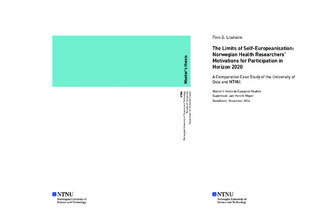| dc.description.abstract | This thesis aims to analyse Norwegian health researchers’ perception of the EU Framework Programmes. The central research goal is to understand and explain why they may choose to abstain from the Horizon 2020. The background for the study is that increased participation towards the programme is an important ambition of the Norwegian government. My focus is on health research; in particular, as statistics have demonstrated that health researchers have a lower return rate from the programme than many other research fields in Norway. Hence, I assume that health research is a particularly critical case requiring most explanation. The thesis aims to study this in the perspective of European integration. The theoretical framework combines a Europeanisation approach with a neo-institutional framework, focusing on rational choice institutionalism, sociological institutionalism and the concept of path dependency from historical institutionalism. These concepts were used to study what could attract Norwegian health researchers towards integration, but also to explain what could prevent integration of Norwegian researchers into the framework programme. The thesis has been conducted by doing a case study of the University of Oslo, and the NTNU.
The thesis is based on information from research literature, public documents and semi-structured interviews specifically conducted for this thesis with central advisers at the universities, and health researchers.
The thesis finds that health research at the universities has been Europeanised, with the universities strategies clearly pointed towards doing H2020 research. In addition, several health researchers are participating in the Framework Programmes. However, the universities health researchers are free when choosing to participate in the EU Framework Programmes. Important motivations for participating in the programmes are generous funding, network, prestige, the exchange of ideas, and to solve societal challenges within Europe. General reasons for not participating are the application process, low probability of success, a lack of resources and network, culture and language differences and calls that does not fit the researcher’s competence. More specific reasons for health researchers may be: competing national funding sources, a busy schedule with several duties, and a strong competition in European health research. The rational choice institutionalism has proved to be the most potent theory for explaining the findings, as the researchers’ evaluations of the advantages and disadvantages of the H2020 determines if they participate. | nb_NO |
